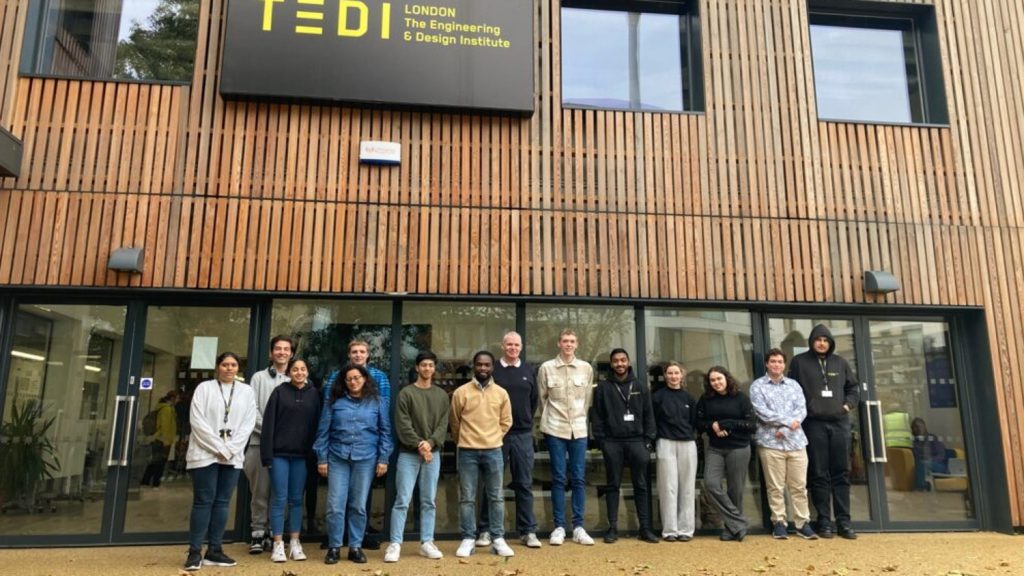Positive change starts with changing the way that we educate future engineers, writes Judy Raper, Dean and CEO of TEDI-London, the Capital’s newest higher education provider devoted to design and engineering
When I was given the chance to become Dean and CEO of The Engineering & Design Institute London (TEDI-London), a new engineering higher education provider looking to embrace a completely different way of doing things, I knew it was an opportunity I couldn’t pass up.
Why? TEDI-London exists to meet some of the longstanding needs of our profession: for a diverse workforce and for well-rounded, work-ready graduates, who understand how society will use the solutions they develop.
We need innovators who are conscientious, contextually aware and environmentally focused. The good news is that, through moving away from traditional education models, it is possible to meet our industry’s needs. And given that future engineers will have a key part to play when it comes to solving the increasingly urgent global challenges we’re facing, it has never been more important for us to prepare them properly.
Diversity matters
To help achieve this, we need to modify processes that impact aspiring engineers before they even apply. Nine times out of 10, candidates are required to have completed a Maths A level, or equivalent qualification, to study engineering. Given that females, members of ethnic minority groups and those from lower socioeconomic backgrounds are statistically less likely to pursue a higher-level maths qualification, are traditional admissions processes a barrier to outcomes we desperately need?
Granted, engineers need to have an aptitude for maths. But this can be assessed as part of the admissions process and built into the degree itself; we needn’t rely on students having prior knowledge.
From my experience, if a candidate can demonstrate the ability to carry out basic mathematical problem-solving, they have the aptitude to succeed as an engineer. Their preference for arts or humanities subjects at age 16 shouldn’t be the reason why their ambition to join our profession is thwarted. What’s more, teams with a blend of different creative and technical skills develop better solutions. Innovation requires creativity, so students with nonmathematical backgrounds should be welcomed, not discouraged.
At TEDI-London – and a handful of other providers – this is working already; the option for applicants without a maths background to take either an aptitude test or maths refresher course has led to a more diverse student population, with females comprising 41% and members of ethnic minority groups comprising 59% (at the time of writing).
Students need to learn theory, but it’s practical application that often motivates them and makes it stick
Workplace preparation
Once they enter the workplace, how often do engineers attend lectures or exams? Despite not being representative of a working environment, degree programmes are often centred around lectures, with students rarely undertaking practical work in their first couple of years.
Students need to learn theory, but it’s practical application that often motivates them and makes it stick. A project-based curriculum gives students the chance to see how their knowledge applies to real-life examples. What’s more, it enables them to naturally develop the workplace skills that graduates tend to lack, like project management, commercial awareness, communication and adaptability.
If every engineering student was able to apply their knowledge within a project team where they become familiar with collaboration, planning and time management, drawing upon each other’s strengths and communication, they’d surely develop a more well-rounded skillset.
Assessing students through their project work helps them gain valuable experience in producing reports, presentations, prototypes, and portfolios. By the time they graduate, they’ll be comfortable with delivering presentations, written communication, critical analysis of their own and others’ work, and conveying information to different audiences, both within and outside the industry.
Instilling positive values
Given that engineers have the power to use their knowledge and skill to help tackle our global challenges, I’ve always wondered why ethics is presented as a standalone module at the end of most programmes, rather than being threaded throughout. If students aren’t expected to think carefully about the social, environmental and economic consequences of their ideas, how can we expect them to do so after graduation?
Adopting a project-based model, where each project is centred around the UN Sustainable Development Goals, and where students design solutions for local stakeholders such as businesses and charities works wonders when it comes to embedding ethical values.
Given the opportunity to practice applying these thought processes, students realise first-hand how important sustainability, social and fiscal responsibility and ethics are in real-life projects. Plus, properly conducting research to understand the needs of stakeholders and end users as part of every university project establishes good habits for an entire career.
From what I’ve seen at TEDI-London so far, I truly believe that disrupting the status quo is what engineering education needs. Giving diverse student teams opportunities to contribute before they graduate motivates them to consider the consequences of their work and draw on the skills and perspectives of their peers. The production of high-quality solutions to real problems attracts a wider pool of diverse talent – and so the virtuous cycle continues.
About the author:
Professor Judy Raper has worked as TEDILondon’s Dean & CEO since its incorporation in June 2019.
During her career, Judy has been named one of Australia’s 100 most influential engineers, one of Australia’s 10 leading female engineers in 2019, and has received an award for leadership in engineering named in her honour from UNSW Sydney.
TEDI-London is looking for Associate Teaching Staff to join its ranks. Whether you’re based in industry and would relish the opportunity to share your knowledge with future engineers, or you have teaching experience and want to help shape the school’s innovative pedagogical approach, they’d like to hear from you! Click here for more info.






